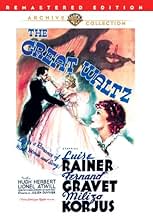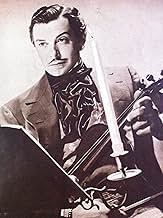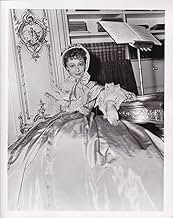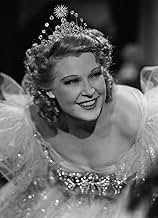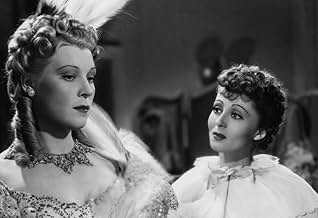Füge eine Handlung in deiner Sprache hinzuJohann Strauss II pursues his passion for waltzes in 1845 Vienna, facing societal resistance. His music gains popularity through opera singers, leading to fame and personal conflicts between... Alles lesenJohann Strauss II pursues his passion for waltzes in 1845 Vienna, facing societal resistance. His music gains popularity through opera singers, leading to fame and personal conflicts between his wife and a passionate affair.Johann Strauss II pursues his passion for waltzes in 1845 Vienna, facing societal resistance. His music gains popularity through opera singers, leading to fame and personal conflicts between his wife and a passionate affair.
- 1 Oscar gewonnen
- 2 Gewinne & 3 Nominierungen insgesamt
- Johann Strauss
- (as Fernand Gravet)
- Wertheimer
- (as Sig Rumann)
- Revolutionary
- (Nicht genannt)
Empfohlene Bewertungen
It's impersonal but it nevertheless displays Duvivier's extraordinary eclecticism."The great waltz" is a good work,made with care and taste and shows that Duvivier could have been a great musicals director,if he had wanted to.Half of the movie consists of instrumentals or songs,which makes sense,for it is a movie dealing with Strauss's life.His private life does not interest that much Duvivier who avoids the traps of a linear biography.However,there are snatches of melodrama towards the end,mainly in the scenes between the moving Luise Rainer and Miliza Korjus in the theater.Fernand Gravey (spelled "Gravet" in the cast and credits)is the only French actor here.He had begun his American career with Mervyn LeRoy in 1937.
All the musical scenes are dazzling ;the "blue Danube" treatment is excellent,a waltz which would be used by dozens of directors,from Renoir ("Boudu Sauvé des Eaux" ) to Kubrik ("2001" ) to Cimino ("Heaven's gate"). Other good sequence: Strauss composing a new tune while he is hearing a horse' s trot.
Miss Rainer's charms elude me. She was pretty and not a bad actress by any means and yet the clammy, self-congratulatory air of masochism and eye-brimming sadness of each of her performances is hard to take. Even when you have to admit that she isn't bad in a given scene, she is insufferable, sometimes almost unwatchable. And she had her most cringing, masochistic and melodramatic role in this picture as the long-suffering wife of a faithless Strauss as played by a puffy Fernand Gravey.
It is Gravey and Miliza Korjus that are the real stars of the film, and this is curious to a modern viewer since neither had the classic good looks of movie stars of the period. What they did have was a stars' confidence and because of the considerable imagination of Julien Duvivier, you believe them as a romantic couple and as stars intoxicated with their own love and talent.
But what is impressive about THE GREAT WALTZ is the way Duvivier transforms potentially dull and static numbers into surreal flights of fantasy. He isn't afraid to be delirious or silly so a few set-pieces unexpectedly catch your attention, make you laugh and then impress you with their theatricality and verve. Such is the orgasmic waltz sequence that takes place in and around a bandstand in the Vienna Woods in which Korjus decisively seduces Gravey. It is Duvivier's attention to detail that makes it: the way Korjus jackknifes to the ground in Gravey's arms and removes her organdy picture hat, the gorgeous line of trees hung with Japanese lanterns on a moonlit set, the way she staggers and tumbles onto the grass after her trilling climax, inviting greater liberties (despite the all-girl orchestra looking on), all of these images make the scene breathless, ludicrous, memorable.
And just because we have blessedly forgotten Strauss's dreary wife, Duvivier concocts a spectacular scene for Rainer too: publicly confronted by her husband's faithlessness, she hurriedly dresses in silks and crinolines determined to kill herself or someone else on the night of his opera debut. Sweeping out of their huge house and down their long staircase to the strains of a waltz, sweeping into a baroque opera house and up an even longer set of steps, she stops, awestruck while several jump cuts reveal the enormity and grandeur of the theatre, the rapt audience and the triumph of her rival, who defiantly swirls into a lavish stage waltz. In contrast, Rainer's smiling-through-tears routine afterward seems an anti-climax, though it is an admirable piece of showmanship and hugely entertaining despite a shrill note of barely controlled hysteria she has cultivated throughout the sequence. Or maybe because of it. Rainer's few strengths as an actress are utterly linked to her considerable weaknesses.
So I'm now not surprised to learn of this film's great success at the time, though I do wonder why the Mac-Eddy productions never got as creative a craftsman as Duvivier to plan and film their pictures. If he had they might be more widely admired today beyond the group of fast-ageing fans who first loved them in the '30s. But maybe nothing can revive interest in this most unfashionable of movie genres.
Wusstest du schon
- WissenswertesToscha Seidel, the Russian virtuoso violinist, was hired especially to dub the solos on the soundtrack for Johann Strauss (Fernand Gravey) and began a new career working as a concert master at MGM and other studios.
- Zitate
Johann 'Schani' Strauss II: Thanks for firing me, Mr. Wertheimer. Goodbye, you worms!
- VerbindungenFeatured in Another Romance of Celluloid (1938)
- SoundtracksTales From the Vienna Woods, Op.325
(1868) (uncredited)
Music by Johann Strauss
Lyrics by Oscar Hammerstein II
Hummed by Fernand Gravey as it is being composed
Sung by Miliza Korjus
Played as background music often
Top-Auswahl
- How long is The Great Waltz?Powered by Alexa
Details
- Laufzeit
- 1 Std. 37 Min.(97 min)
- Farbe
- Seitenverhältnis
- 1.37 : 1


